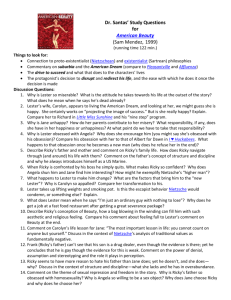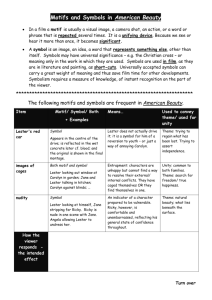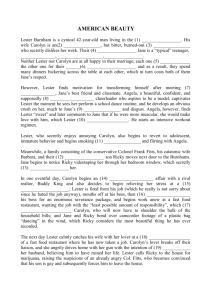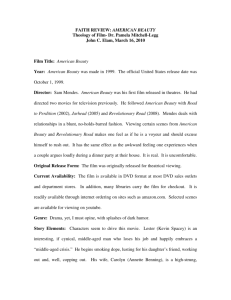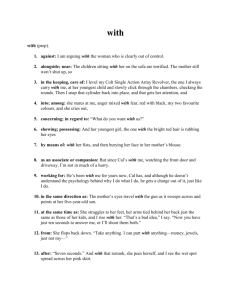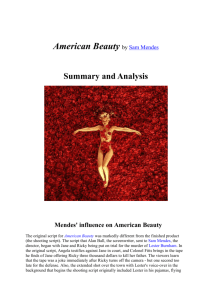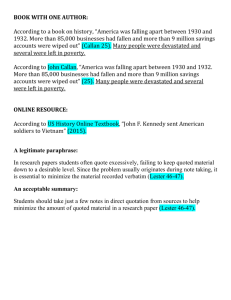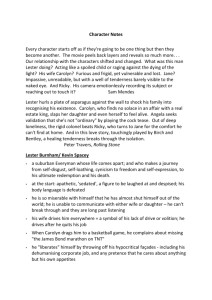Fight Club American Beauty
advertisement
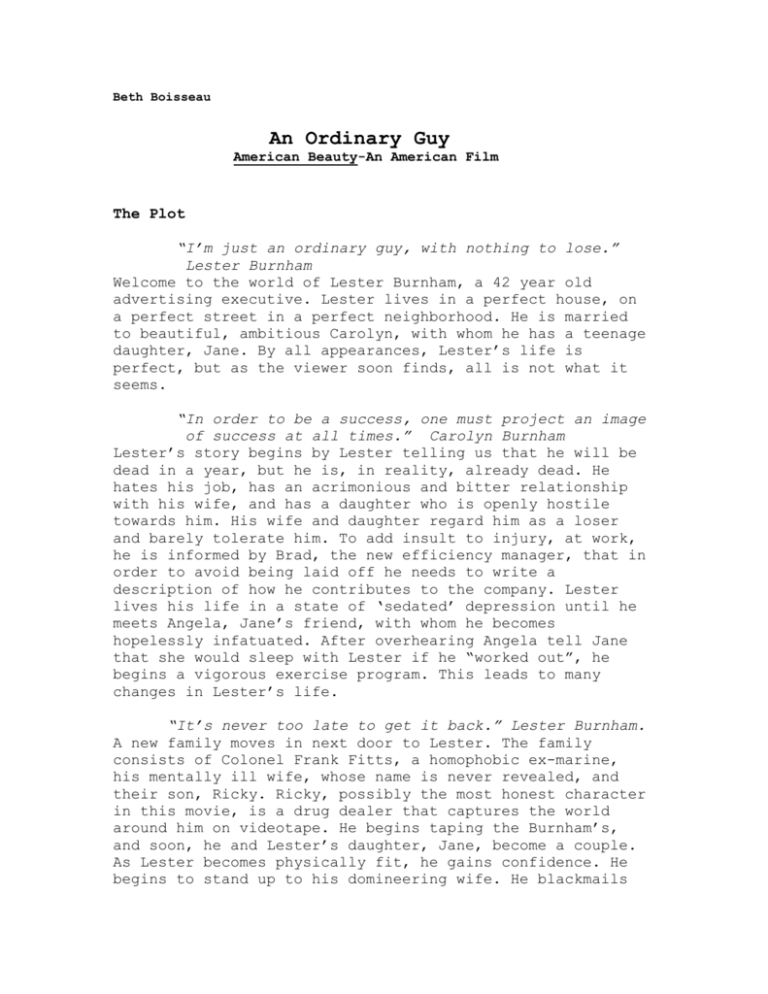
Beth Boisseau An Ordinary Guy American Beauty-An American Film The Plot “I’m just an ordinary guy, with nothing to lose.” Lester Burnham Welcome to the world of Lester Burnham, a 42 year old advertising executive. Lester lives in a perfect house, on a perfect street in a perfect neighborhood. He is married to beautiful, ambitious Carolyn, with whom he has a teenage daughter, Jane. By all appearances, Lester’s life is perfect, but as the viewer soon finds, all is not what it seems. “In order to be a success, one must project an image of success at all times.” Carolyn Burnham Lester’s story begins by Lester telling us that he will be dead in a year, but he is, in reality, already dead. He hates his job, has an acrimonious and bitter relationship with his wife, and has a daughter who is openly hostile towards him. His wife and daughter regard him as a loser and barely tolerate him. To add insult to injury, at work, he is informed by Brad, the new efficiency manager, that in order to avoid being laid off he needs to write a description of how he contributes to the company. Lester lives his life in a state of ‘sedated’ depression until he meets Angela, Jane’s friend, with whom he becomes hopelessly infatuated. After overhearing Angela tell Jane that she would sleep with Lester if he “worked out”, he begins a vigorous exercise program. This leads to many changes in Lester’s life. “It’s never too late to get it back.” Lester Burnham. A new family moves in next door to Lester. The family consists of Colonel Frank Fitts, a homophobic ex-marine, his mentally ill wife, whose name is never revealed, and their son, Ricky. Ricky, possibly the most honest character in this movie, is a drug dealer that captures the world around him on videotape. He begins taping the Burnham’s, and soon, he and Lester’s daughter, Jane, become a couple. As Lester becomes physically fit, he gains confidence. He begins to stand up to his domineering wife. He blackmails Brad into an enormous severance package, thus leaving his job, and trades in his Toyota Camry for the car of his dreams. His new found confidence leads more and more to glimpses of true happiness, and he begins to rediscover who he is. After being re-introduced to pot by Ricky, he begins to smoke marijuana regularly, takes a job in a fast food restaurant, and starts listening to music that he enjoyed in his youth. In the meantime, his wife begins having an affair with rival realtor, Buddy King, and his daughter resents her father for his embarrassingly lecherous behavior in front of Angela. Colonel Fitts, revealed to be a repressed homosexual, mistakenly thinks his son and Lester are having an affair, and makes a pass at Lester, who politely declines. “Never underestimate the power of denial.” Ricky Fitts The film culminates with Lester realizing that Angela is merely a child, and that his fantasy of her must stay just that, a fantasy. In a flash of truth, he realizes that he is, indeed, truly happy. As we watch contentment fill him like a beautiful light, Colonel Fitts, unable to deal with the truth of his homosexuality, shoots Lester in the back of the head. In a moment of artistic irony, Lester, who has only just realized the happiness and richness of his life, dies. The Scene “Have you ever known anyone who died?” “No. Have you?” “No, but I once saw this homeless woman who froze to death. It was amazing.” “What was amazing about it?” “It is like, when you see someone like that, it is like, for a second God is looking right at you and if you are careful, you can look right back.” “What do you see?” “Beauty.” The scene opens with Mrs. Fitts sitting, her back to us, in her immaculate dining room. The only sound is the ticking of the clock. We aren’t told how long she has been sitting in that room, only that she is utterly alone. Ricky and Jane come in, and after introducing Jane to his mother, Ricky shows Jane his father’s Nazi plate. He asks Jane if he scares her, and when she says no, he invites her to see “the most beautiful thing I’ve ever recorded.” Ricky and Jane sit with their backs toward the audience, quietly bathed in shadow in front of a large TV screen. A slow, simple, yet melancholy piano piece plays. On the screen, a pure white bag dances, against a bright red wall, playing with the golden leaves, oblivious to the gray and lonely day. Seemingly from above, Ricky’s voice narrates. “It’s one of those days, where it’s a minute from snowing. And there’s this electricity in the air. You can almost hear it.” The bag continues to dance. Whirling, flitting, prancing upon blue gray asphalt. “And this bag was just Dancing. With me. Like a little kid begging me to play with it.” Up in the air, the bag twirls, here, there. Higher. We look into Ricky’s face, still in the shadow, eyes, bright, alive. “That’s the day I realized that there was this... entire life behind things.” The bag fills the entire screen, pure white against bright red. “And this incredible, benevolent force....” The bag slows, the dancing becomes soulful. “Wanted me to know, there was no reason to be afraid...” The bag meets the ground. “Ever.” “Video’s a poor excuse I know, but it helps me remember. I need to remember. Sometimes there is so much beauty.” The scene ends with Jane’s face, still in the shadows, becoming illuminated, her eyes moist. She takes Ricky’s hand in hers, and she kisses him. She understands, and the dappled sunlight from behind the blinds illuminates her face in the shadowy darkness. She then realizes she is late for dinner, and the scene ends. Analysis and Interpretation “Anything that is meant to happen, will...eventually” Angela Hayes. When this scene opens and we are alone with Ricky’s mother; there is no sound other than the ticking of the clock, promoting a mood of sadness and solitude. The lighting is low key, unlike the rest of the movie, which is vividly colored in shades of red and blue. The Fitts’ house is nearly devoid of color. The combination of the low key lighting and the absence of color make the viewer feel an eerie, almost ominous sense of foreboding and loneliness. It suggests that this is not a happy house. This is the case until we are taken into Ricky’s room to view the tape on which he captures the dancing bag. In this part of the scene, the music sets a calming, peaceful mood, and the grayness of the room is balanced with the bit of light which finds its way in through the unopened blinds. The grayness mixed with the light lends itself to the sense of peace and quiet serenity. The only color in the room comes from the large TV screen upon which the bag weaves its spell. The background of bricks is a bold red, the blue/gray of the asphalt, and the golden leaves contrast with the pure white of the bag. The viewer is led from the screen with the bag, to Ricky and Jane through jump cut shots, but when viewing the bag, it is as if we are looking through the characters’ eyes. Throughout this film, the story of Lester and his redemption, is intertwined with that of Ricky, whose life, while far less outwardly successful, is one of simple truth and beauty. Ricky acts as the divine messenger in the film, and this makes this scene the most important in the movie. By summarizing the meaning of this movie, this scene stands on its own merit, both explaining the film’s message, as well as being a truth in and of itself. It sends a message of hope, that there is a benevolent force, and tells us that we should never, ever be afraid. It tells us that there is divine beauty all around us, in everything, should we open our eyes and look. Judging “And this incredible, benevolent force...wanted me to know, that there was no reason to be afraid. Ever.” Ricky Fitts The film American Beauty is a true masterpiece. It is majestic and humble all at once, and through superb acting, storytelling, and cinematography, American Beauty brings to the viewer a message of hope, acceptance, and love. More than anything, this film tells us, the viewers, that in spite of all our flaws, we are all beautiful.
